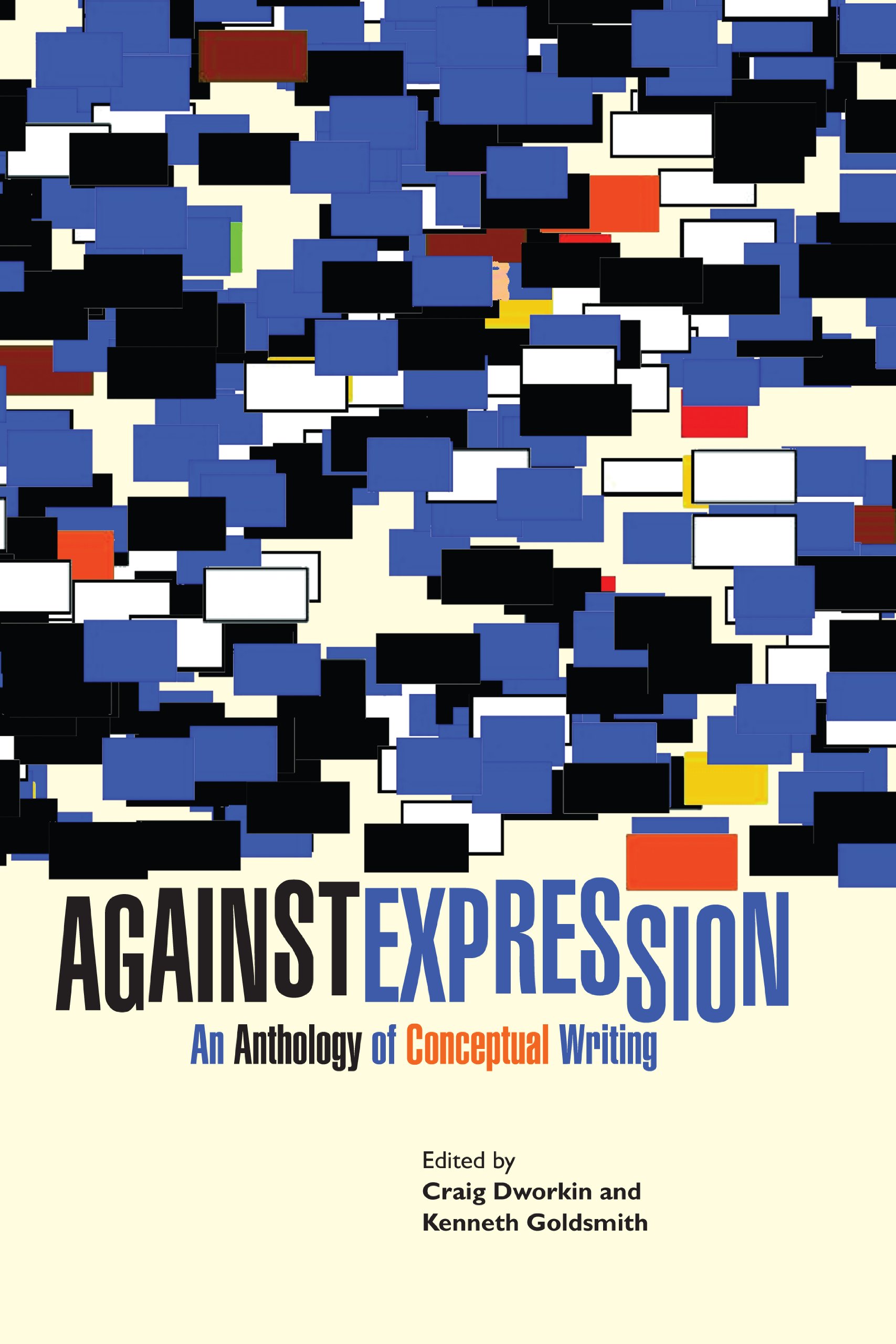Craig Dworkin, Kenneth Goldsmith (eds.): Against Expression: An Anthology of Conceptual Writing (2011)
Filed under poetry | Tags: · avant-garde, conceptual writing, concrete poetry, language, literature, oulipo, poetry, uncreative writing

“In much the same way that photography forced painting to move in new directions, the advent of the World Wide Web, with its proliferation of easily transferable and manipulated text, forces us to think about writing, creativity, and the materiality of language in new ways.
In Against Expression, editors Craig Dworkin and Kenneth Goldsmith present the most innovative works responding to the challenges posed by these developments. Charles Bernstein has described conceptual poetry as “poetry pregnant with thought.” Against Expression, the premier anthology of conceptual writing, presents work that is by turns thoughtful, funny, provocative, and disturbing.
Dworkin and Goldsmith, two of the leading spokespersons and practitioners of conceptual writing, chart the trajectory of the conceptual aesthetic from early precursors including Samuel Beckett and Marcel Duchamp to the most prominent of today’s writers. Nearly all of the major avant-garde groups of the past century are represented here, including Dada, OuLiPo, L=A=N=G=U=A=G=E, and Flarf to name just a few, but all the writers are united in their imaginative appropriation of found and generated texts and their exploration of nonexpressive language. Against Expression is a timely collection and an invaluable resource for readers and writers alike.”
Publisher Northwestern University Press, 2011
Avant-garde & Moderism Collection series
ISBN 0810127113, 9780810127111
593 pages
Reviews: Brian M. Reed (American Book Review), Stephen Burt (London Review of Books), Peli Grietzer (LA Review of Books), Richard Kostelanetz (Mayday), Andrew McCallum (English in Education), Samuel Vriezen’> (deReactor, NL).
Commentary: Sam Rowe (Full Stop).
Interview with Craig Dworkin (Katie L Price, Jacket2).
PDF (updated on 2014-12-12)
Comments (5)Anne Burdick, Johanna Drucker, Peter Lunenfeld, Todd Presner, Jeffrey Schnapp: Digital_Humanities (2012)
Filed under book | Tags: · data mining, data visualisation, digital humanities, education, linguistics, simulation

“Digital_Humanities is a compact, game-changing report on the state of contemporary knowledge production. Answering the question, “What is digital humanities?,” it provides an in-depth examination of an emerging field. This collaboratively authored and visually compelling volume explores methodologies and techniques unfamiliar to traditional modes of humanistic inquiry–including geospatial analysis, data mining, corpus linguistics, visualization, and simulation–to show their relevance for contemporary culture.
Included are chapters on the basics, on emerging methods and genres, and on the social life of the digital humanities, along with “case studies,” “provocations,” and “advisories.” These persuasively crafted interventions offer a descriptive toolkit for anyone involved in the design, production, oversight, and review of digital projects. The authors argue that the digital humanities offers a revitalization of the liberal arts tradition in the electronically inflected, design-driven, multimedia language of the twenty-first century.
Written by five leading practitioner-theorists whose varied backgrounds embody the intellectual and creative diversity of the field, Digital_Humanities is a vision statement for the future, an invitation to engage, and a critical tool for understanding the shape of new scholarship.”
Publisher MIT Press, 2012
Open Access
ISBN 0262018470, 9780262018470
x+141 pages
Harry Collins: Tacit and Explicit Knowledge (2010)
Filed under book | Tags: · actor-network theory, knowledge, language, meaning, neural networks, prosthesis, society, sociology, sociology of science, tacit knowledge

“Much of what humans know we cannot say. And much of what we do we cannot describe. For example, how do we know how to ride a bike when we can’t explain how we do it? Abilities like this were called “tacit knowledge” by physical chemist and philosopher Michael Polanyi, but here Harry Collins analyzes the term, and the behavior, in much greater detail, often departing from Polanyi’s treatment.
In Tacit and Explicit Knowledge, Collins develops a common conceptual language to bridge the concept’s disparate domains by explaining explicit knowledge and classifying tacit knowledge. Collins then teases apart the three very different meanings, which, until now, all fell under the umbrella of Polanyi’s term: relational tacit knowledge (things we could describe in principle if someone put effort into describing them), somatic tacit knowledge (things our bodies can do but we cannot describe how, like balancing on a bike), and collective tacit knowledge (knowledge we draw that is the property of society, such as the rules for language). Thus, bicycle riding consists of some somatic tacit knowledge and some collective tacit knowledge, such as the knowledge that allows us to navigate in traffic. The intermixing of the three kinds of tacit knowledge has led to confusion in the past; Collins’s book will at last unravel the complexities of the idea.
Tacit knowledge drives everything from language, science, education, and management to sport, bicycle riding, art, and our interaction with technology. In Collins’s able hands, it also functions at last as a framework for understanding human behavior in a range of disciplines.”
Publisher University of Chicago Press, 2010
ISBN 0226113809, 9780226113807
xiv+186 pages
Reviews: Alan Warde (Sociological Review, 2010), Massimo Mazzotti (Isis, 2011), Wiebe E. Bijker (Technology & Culture, 2011), Stephen P. Turner (Studies in History and Philosophy of Science, 2011), Park Doing (Social Studies of Science, 2011), Joseph Agassi (Philosophy of Social Sciences, 2013).
Commentary: Philosophia Scientiae (Léna Soler, Sjoerd D. Zwart et al., 2013).

